12 Best Platforms for Remote Software Developer Jobs in 2025

The search for high-quality remote software developer jobs can feel overwhelming. With countless platforms all claiming to have the best opportunities, it's difficult to know where to invest your time and energy. Generic job boards often mix in hybrid or on-site roles, while niche sites can have limited listings. This guide cuts through the noise by providing a strategic, curated list of the most effective platforms for developers seeking fully remote work. We’ve done the heavy lifting to help you focus your job hunt more efficiently.
This isn't just another list of links. We provide a detailed analysis of each platform, including our honest assessment of its strengths and weaknesses, ideal use cases, and practical tips for optimizing your search. You'll find direct links and screenshots to give you a clear preview of the user experience before you even visit the site. Whether you are a junior developer looking for your first role or a senior engineer seeking a specialized position, this resource is designed to help you navigate the job market with confidence. Consider this your roadmap to identifying the platforms that will actually connect you with your next great opportunity.
1. RemoteWeek
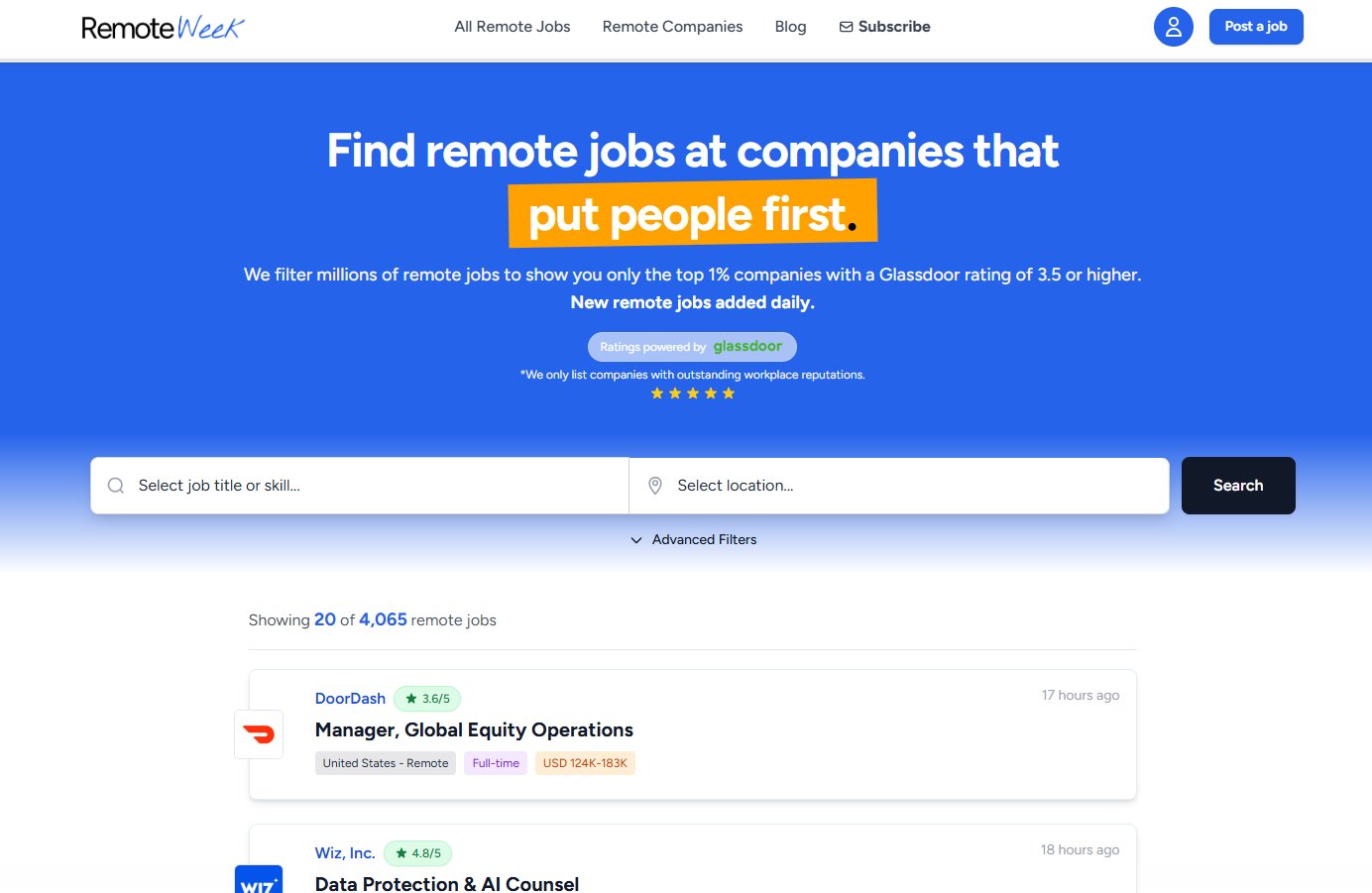
Best For: Engineers and developers seeking a dedicated, high-quality stream of global remote opportunities.
RemoteWeek's Engineering Jobs page secures its top position by offering a meticulously curated and highly specialized platform for developers. Unlike generalist job boards, its exclusive focus on engineering roles eliminates noise, allowing you to concentrate solely on relevant openings. This specialization ensures that every listing is pertinent to your skillset, from front-end development to data engineering and beyond.
The platform distinguishes itself with a commitment to quality over quantity. Each role is sourced from reputable companies, significantly reducing the risk of encountering scams or low-quality offers that can plague larger, less moderated sites. The daily update cadence means you have immediate access to the freshest remote software developer jobs, giving you a competitive edge in a fast-moving market.
Key Strengths and Use Cases
One of its most valuable features is the integration of practical resources directly on the job board. The inclusion of tips and FAQs addresses common pain points for remote job seekers, such as setting up a home office or identifying legitimate employers. This transforms the site from a simple list of jobs into a comprehensive career resource.
- Use Case: A mid-level backend developer can use RemoteWeek's focused search to quickly find Python or Java roles that are 100% remote, bypassing the irrelevant listings on broader platforms. The integrated resources can then help them prepare for video interviews and salary negotiations specific to remote work.
Practical Tips for Success
To maximize your chances, set up a daily check-in to catch new listings as they are posted. Tailor your resume and cover letter using keywords from the job descriptions, as this is a crucial step for getting past initial screenings. For more in-depth strategies on securing a position, you can review RemoteWeek's guide on how to find remote jobs.
Visit the platform: RemoteWeek Engineering Jobs
2. Lemon.io

Lemon.io positions itself as a streamlined, high-quality platform connecting US and European companies with the top 3% of global developers for long-term remote contracts. The core value for developers is efficiency: Lemon.io handles all client acquisition and rigorous technical vetting (skills, communication, and English fluency), ensuring that only serious, high-paying opportunities reach the talent pool. This process eliminates the time wasted on cold applications and low-bid marketplaces, allowing experienced engineers to focus solely on high-value, fully remote work.
Key Details & Strategy
Best Use Case: Senior developers and specialized engineers (Full-stack, Mobile, Backend) who are confident in their skills and seek a rapid, direct pipeline to premium, long-term remote contracts without the hassle of job searching.
Pricing: Completely free for developers.
Pro Tip: Be prepared for a demanding vetting process. A successful acceptance into the Lemon.io network acts as a permanent stamp of approval, dramatically reducing the effort required for future client acquisition and ensuring competitive, transparent hourly rates.
While not exclusively a job board, Lemon.io serves as an exceptionally high-signal talent marketplace for engineers prioritizing high pay and minimal administrative overhead in their remote careers.
Website: https://lemon.io
3. Indeed
As one of the world's largest job aggregators, Indeed is a volume-heavy resource for finding remote software developer jobs in the US and beyond. Its main strength is its sheer breadth, pulling listings from thousands of company career pages and job boards into a single, searchable interface. For developers who want to cast a wide net and see the full spectrum of available positions, Indeed is an essential starting point.
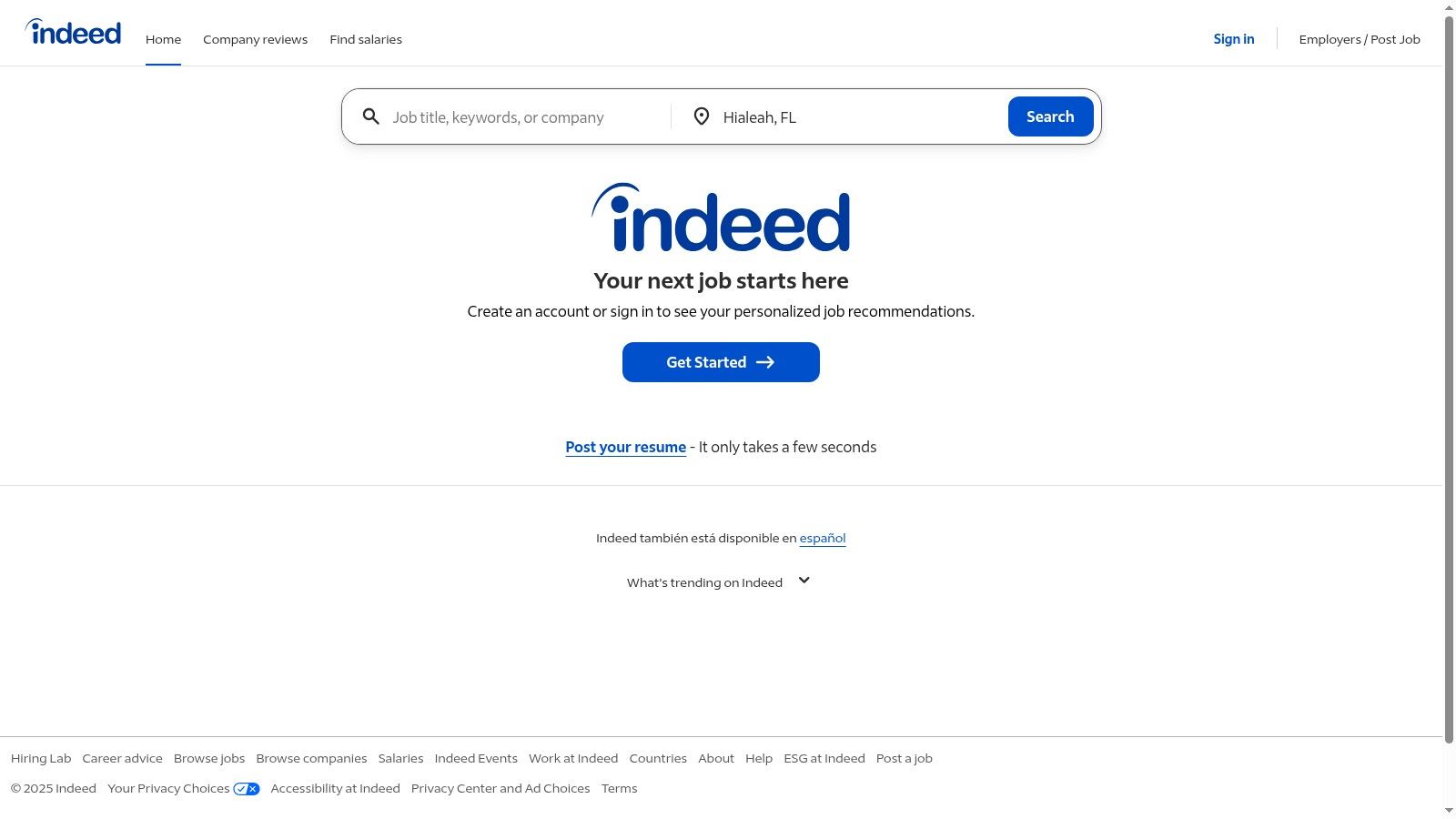
The platform offers powerful search filters that allow you to specify "remote" work, desired salary ranges, and experience levels, helping to cut through the noise. Features like company reviews and salary data provide valuable context for each listing. While its massive inventory is a plus, it means you may encounter duplicate postings or a higher proportion of roles from staffing agencies compared to more curated boards.
Key Details & Strategy
Best Use Case: High-volume searching across all experience levels, especially for developers wanting to quickly survey the market and set up alerts for new opportunities.
Pricing: Free for job seekers. Employers pay to sponsor job posts for better visibility.
Pro Tip: Use the "Advanced Job Search" feature to combine keywords with boolean operators (e.g., "Java" AND "Spring" NOT "Manager") for highly specific results. Setting up targeted job alerts is crucial to stay ahead of the competition.
Despite the need for careful filtering to weed out lower-quality or irrelevant posts, Indeed's comprehensive coverage and frequent updates make it a foundational tool for any remote software developer job search.
Website: https://www.indeed.com
4. ZipRecruiter
ZipRecruiter is a major job aggregator that excels at speed and convenience, making it a powerful tool for discovering a high volume of remote software developer jobs. Its most notable feature is the "1-Tap Apply" function, which significantly streamlines the application process, allowing you to submit your resume to multiple roles in a fraction of the time it would take on other platforms. The platform's algorithm is also quite effective at sending daily job alerts tailored to your profile and search history.
This focus on efficiency makes it ideal for developers who want to cast a wide net quickly. The platform provides consistent updates on your application status via email and mobile notifications, keeping you in the loop. While it’s a general job board, its strong filtering capabilities for remote positions and wide adoption by US companies, from startups to large enterprises, ensure a steady stream of relevant opportunities.
Key Details & Strategy
Best Use Case: Rapidly applying to a large number of remote roles, especially for developers who prioritize an efficient, high-volume job search.
Pricing: Free for job seekers. Employers pay to post jobs and access the resume database.
Pro Tip: Take the time to fully complete your profile, including skills and desired salary. ZipRecruiter's matching algorithm heavily relies on this data to send you relevant job alerts, saving you manual search time.
The primary drawback is that the relevance of job matches can sometimes be inconsistent, and the quality of recruiter outreach can vary. However, for a fast-paced search for some of the highest paying remote jobs, ZipRecruiter's speed is a distinct advantage.
Website: https://www.ziprecruiter.com
5. Glassdoor
Glassdoor’s unique value proposition is its combination of a job board with a massive repository of user-generated company data. For developers seeking remote software developer jobs, this means you can simultaneously search for roles and conduct due diligence on a company's culture, compensation, and interview process. This side-by-side access to information is critical when evaluating remote-first policies and team environments, which are often hard to gauge from a simple job description.
The platform provides an inside look at how a company truly operates. You can read anonymous reviews from current and former employees, find detailed salary data for specific roles, and even get insights into the technical interview questions asked. This context helps you identify genuinely supportive remote workplaces and avoid companies with a poor track record, saving you significant time and effort in your job search.
Key Details & Strategy
Best Use Case: Researching company culture, salary benchmarks, and interview processes while simultaneously searching for remote roles. Essential for vetting potential employers.
Pricing: Free to use. Access to detailed reviews and salary data often requires users to contribute their own anonymous data (like a salary or company review).
Pro Tip: Use the "Interview" section to prepare for technical screenings. Search for software developer roles at a target company to find specific questions and feedback on the difficulty of their interview process.
While the search filters for remote work can sometimes be less intuitive than dedicated job boards, the wealth of qualitative data makes Glassdoor an indispensable research tool for any serious job seeker.
Website: https://www.glassdoor.com
6. LinkedIn Jobs
While not a dedicated remote job board, LinkedIn's sheer scale makes it an indispensable tool for finding remote software developer jobs. Its primary advantage lies in leveraging your professional network. Recruiters are extremely active on the platform, and having a polished profile with the "Open to Work" feature enabled can bring opportunities directly to you.
The platform's job search functionality includes robust filters for "Remote" work, allowing you to narrow down a vast number of listings. Many postings feature an "Easy Apply" option, which streamlines the application process by using your LinkedIn profile. The real power, however, comes from combining job searching with networking. You can see who from your network works at a company, research hiring managers, and make direct connections that often prove more effective than a cold application.
Key Details & Strategy
Best Use Case: Leveraging your professional network to get referrals and be discovered by recruiters for mid-to-senior level roles.
Pricing: Free to use. A paid LinkedIn Premium Career subscription ($29.99/month) unlocks features like InMail credits for contacting non-connections, deeper insights on who viewed your profile, and how you stack up against other applicants.
Pro Tip: Beyond just applying, follow target companies and engage with their content. This increases your visibility to their internal recruiting teams and demonstrates genuine interest.
While the volume of jobs is a major pro, the quality can be inconsistent. You may encounter some spam or poorly defined roles. Nevertheless, its high adoption rate among US tech companies makes it a non-negotiable part of any job search strategy.
Website: https://www.linkedin.com/jobs
7. Hired
Hired flips the traditional job search on its head by creating a marketplace where companies apply to you. Instead of sending out countless applications, developers create a single profile showcasing their skills and preferences. Companies then send interview requests with upfront salary and equity details, dramatically increasing transparency and efficiency in the hunt for remote software developer jobs.

This candidate-forward approach makes it a high-signal platform. Companies on Hired are typically well-funded and serious about hiring, which cuts down on the noise found on larger job boards. The platform also provides "Talent Advocates" who offer coaching on your profile and interview preparation, adding a layer of personalized support to your search. Its emphasis on a streamlined process makes it a powerful tool for experienced engineers.
Key Details & Strategy
Best Use Case: Experienced mid-to-senior developers looking for a time-efficient way to connect with serious, well-funded US-based companies for remote roles.
Pricing: Completely free for job seekers. Companies pay to access the talent marketplace.
Pro Tip: Be highly specific in your profile about your tech stack, project experience, and salary expectations. Since companies see this first, a detailed and polished profile is crucial for attracting top-tier interview requests.
While the curated nature of the platform means higher quality opportunities, its candidate intake is selective. Not all applicants are accepted into the marketplace, and its strongest company presence remains in major US tech hubs.
Website: https://hired.com
8. Wellfound (formerly AngelList Talent)
Formerly known as AngelList Talent, Wellfound is the premier job board for developers seeking opportunities within the startup ecosystem. It excels in connecting talent with innovative, often remote-first companies, making it a goldmine for finding remote software developer jobs with high growth potential. The platform is celebrated for its transparency, with nearly all listings including clear salary and equity compensation ranges upfront.
This direct approach removes the guesswork from the application process, allowing developers to focus on roles that meet their financial expectations. Wellfound’s interface is built for efficiency, featuring powerful filters for remote work, specific time zones, and distributed teams. Candidates can often apply and chat directly with founders or key hiring managers, cutting through the typical layers of HR and getting straight to the decision-makers.
Key Details & Strategy
Best Use Case: Developers specifically targeting high-growth startups and remote-first teams who value salary and equity transparency from the start.
Pricing: Completely free for job seekers.
Pro Tip: Create a rich profile highlighting your startup-relevant skills like adaptability, rapid prototyping, and experience with agile environments. Since you can message founders directly, a well-crafted, concise introduction can significantly increase your chances of getting noticed.
While the platform offers unparalleled access to the startup world, you'll find fewer established Fortune 500 companies here. The nature of startups also means that benefits and company stability can vary widely. However, for those eager to make a big impact in a fast-paced environment, Wellfound is an essential resource.
Website: https://wellfound.com
9. Remote OK
Remote OK is one of the most established and popular job boards dedicated exclusively to remote work. It has a significant focus on tech, making it a prime destination for finding remote software developer jobs. The platform’s interface is designed for speed, allowing you to quickly scan listings with prominent tags for technologies, experience levels, and salary ranges, which are often displayed upfront.
Its global reach means you'll find opportunities from innovative, remote-first companies all over the world. The site also provides helpful resources, including guides on avoiding scams, which adds a layer of trust. The core value of Remote OK lies in its curated, high-quality listings that cut through the noise of hybrid or location-specific "remote" roles found on more generalist platforms.
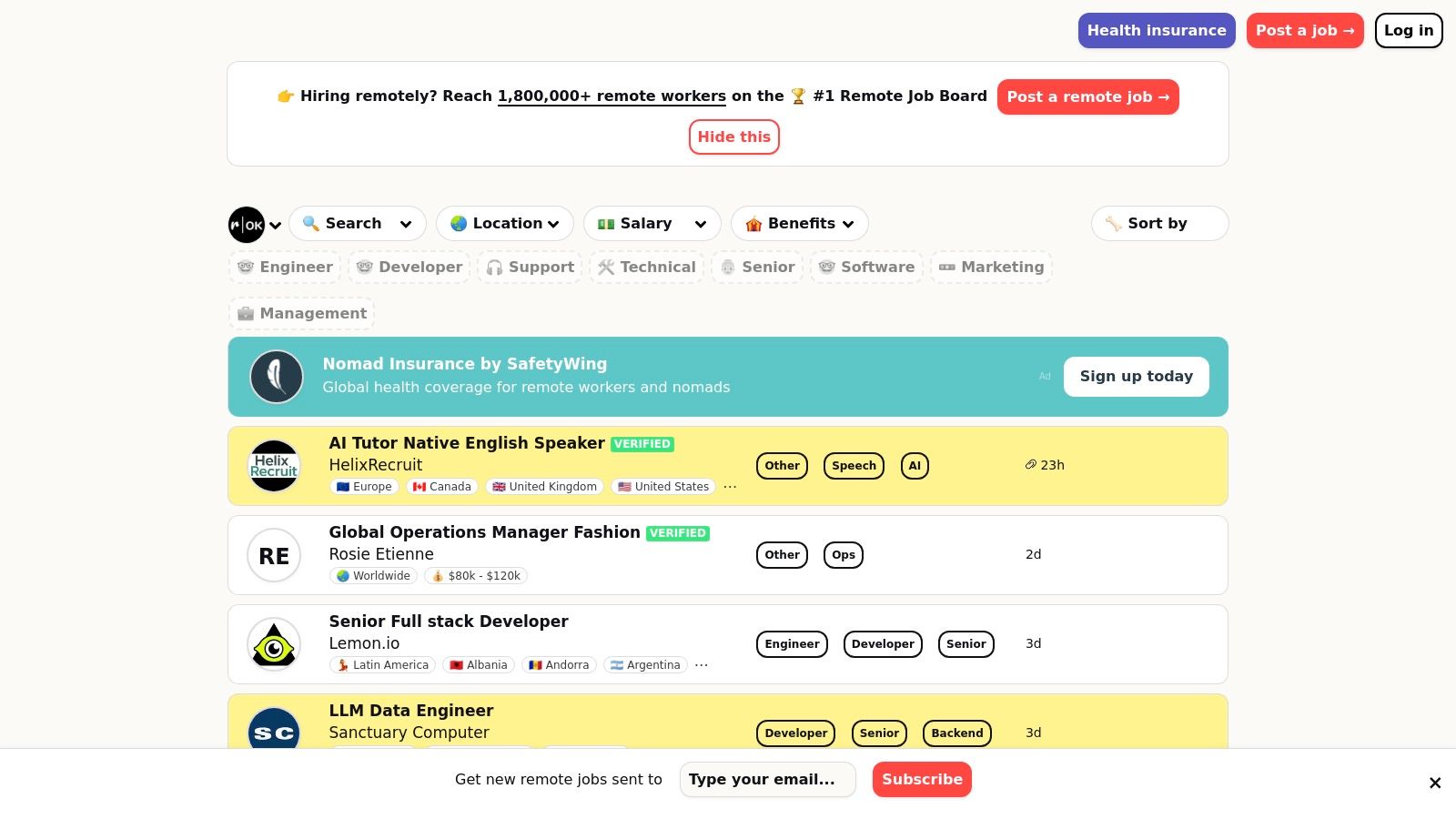
Key Details & Strategy
Best Use Case: Quickly finding legitimate, fully remote developer positions with transparent salary information, especially from global tech companies.
Pricing: Free for job seekers.
Pro Tip: Use the robust tagging system to your advantage. You can filter not just by programming language (e.g., "python," "react") but also by keywords like "startup," "saas," or "fintech" to find roles that match your specific interests and career goals.
While the sheer volume of global jobs is a huge plus, developers in the US must carefully check the location requirements on each posting, as some may have timezone or regional restrictions. Despite this, its strong developer focus and clean interface make it a must-visit site in any remote job search.
Website: https://remoteok.com
10. We Work Remotely
As one of the pioneers in the remote work space, We Work Remotely has built a strong reputation for being a high-quality, curated job board. It’s exclusively for remote positions, which eliminates the noise found on larger, generalist platforms. Its dedicated "Programming" category is a go-to resource for developers looking for legitimate, remote-first companies rather than roles that are only temporarily remote.
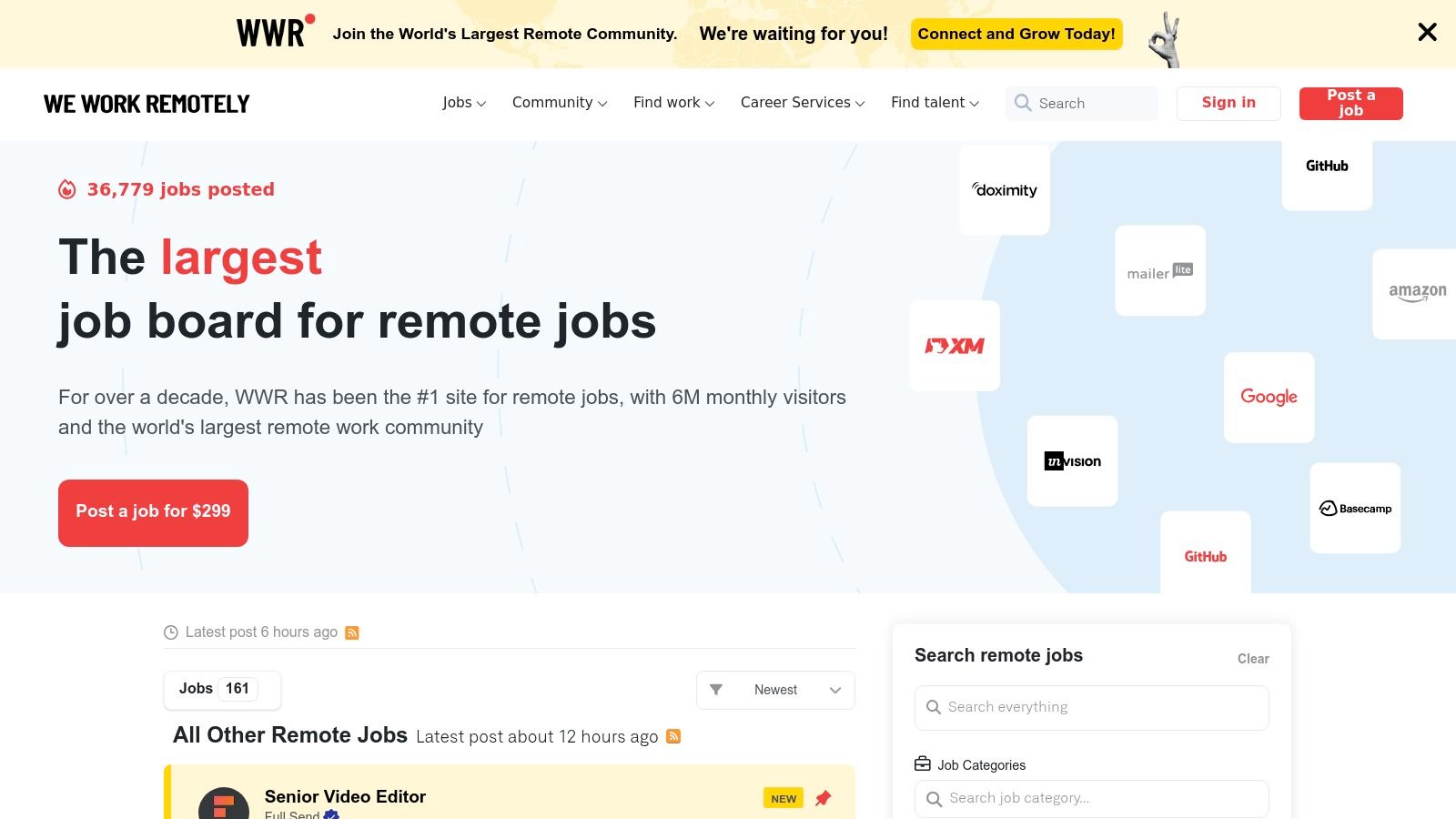
The platform is known for its straightforward, no-frills interface that focuses purely on connecting talent with opportunities. Companies pay a premium to post, which tends to filter out low-quality or spam listings. Because of this curation, developers can often find unique remote software developer jobs at established remote-first companies and promising startups that value remote culture. The quality of the listings and the trust the community places in it make it an essential stop in any remote job search.
Key Details & Strategy
Best Use Case: Finding high-quality, fully remote developer roles at companies that have a strong remote-first culture.
Pricing: Free for job seekers. Companies pay a flat fee of $299 to post a job for 30 days.
Pro Tip: Use the RSS feed feature for specific categories (like "Back End" or "Front End") to get instant notifications in your feed reader without having to constantly check the site. The curation means you're more likely to be applying to legitimate roles, but it's still wise to understand how to spot job scams.
While the volume of jobs is lower than on massive aggregators like LinkedIn or Indeed, the signal-to-noise ratio is significantly better. You will have to check if a role is open to US-based candidates, as many listings are global, but the focus on quality makes it a worthwhile bookmark.
Website: https://weworkremotely.com
11. FlexJobs
FlexJobs stands out by taking a "quality over quantity" approach to job listings. Its core selling point is that every single job is hand-screened by a human to eliminate scams, ads, and commission-only roles. This provides a level of trust and legitimacy that is often missing on larger, free job aggregators, making it an excellent resource for finding high-quality remote software developer jobs without the noise.
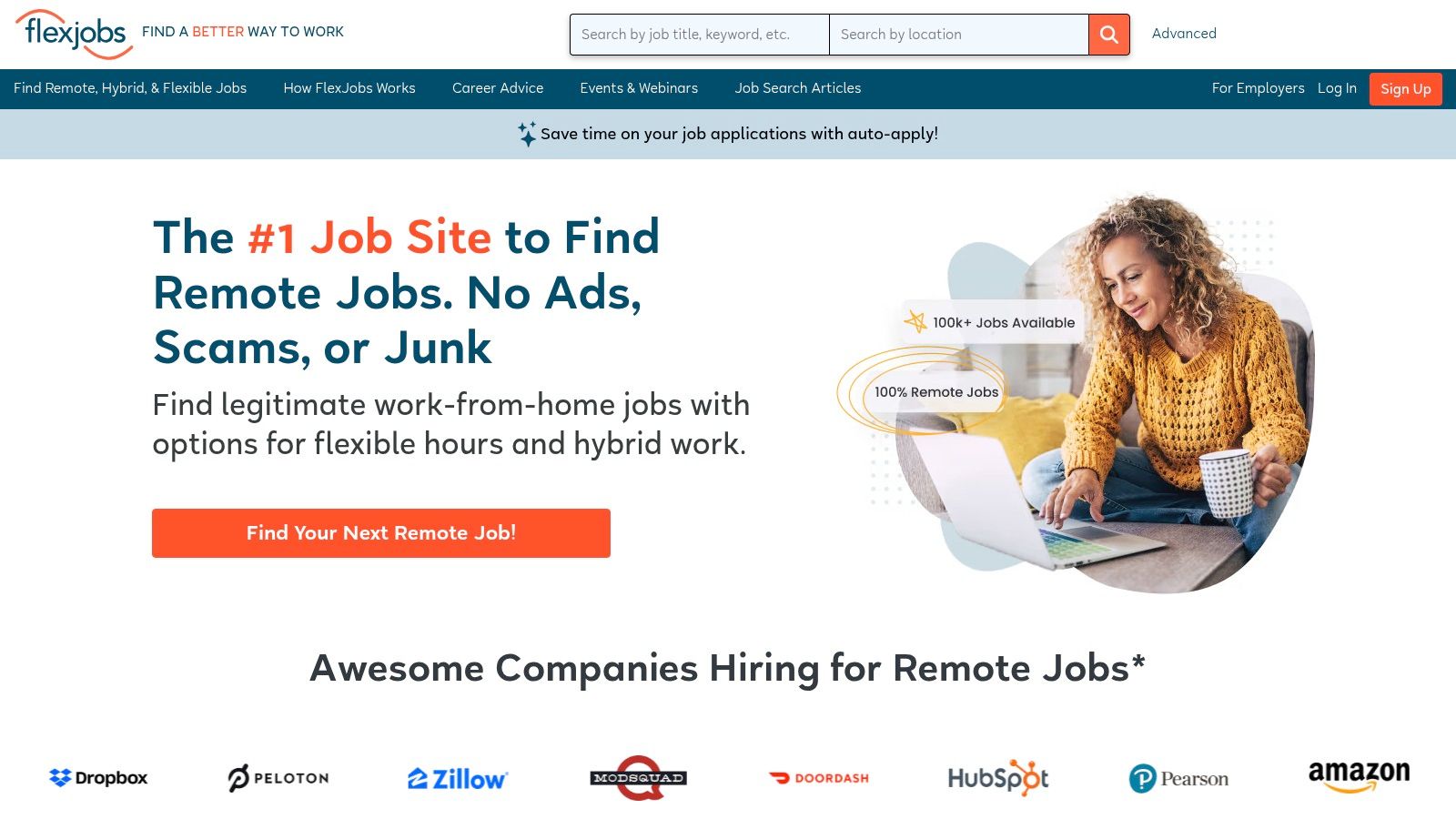
The platform is built entirely around flexible and remote work, offering granular search filters that let you specify the level of remote work you want, from 100% remote to hybrid options. While the volume of tech roles may be smaller than on sites like LinkedIn, the listings are almost always from companies genuinely committed to remote work. The required subscription fee acts as a filter for both employers and job seekers, often resulting in a more serious pool of applicants and less competition per role.
Key Details & Strategy
Best Use Case: Developers who are tired of sifting through scam listings and want a curated, safe job search experience focused exclusively on remote and flexible roles.
Pricing: A paid subscription is required to view full job details and apply. Plans typically start around $25/month, with discounts for longer commitments.
Pro Tip: Take advantage of the career resources included with your subscription. FlexJobs offers access to career coaching, resume reviews, and skills tests that can help strengthen your application.
The primary drawback is the paywall, as all functionality requires a subscription. However, for developers who value their time and security, the fee can be a worthwhile investment to access a pre-vetted stream of legitimate opportunities.
Website: https://www.flexjobs.com
12. Arc.dev
Arc.dev positions itself as a high-quality marketplace for developers seeking long-term remote software developer jobs. It stands out by implementing a rigorous Silicon Valley-style vetting process, which includes technical and behavioral assessments. This ensures that only skilled, senior-level engineers are presented to its network of US-based, remote-first companies, significantly reducing noise for both sides.
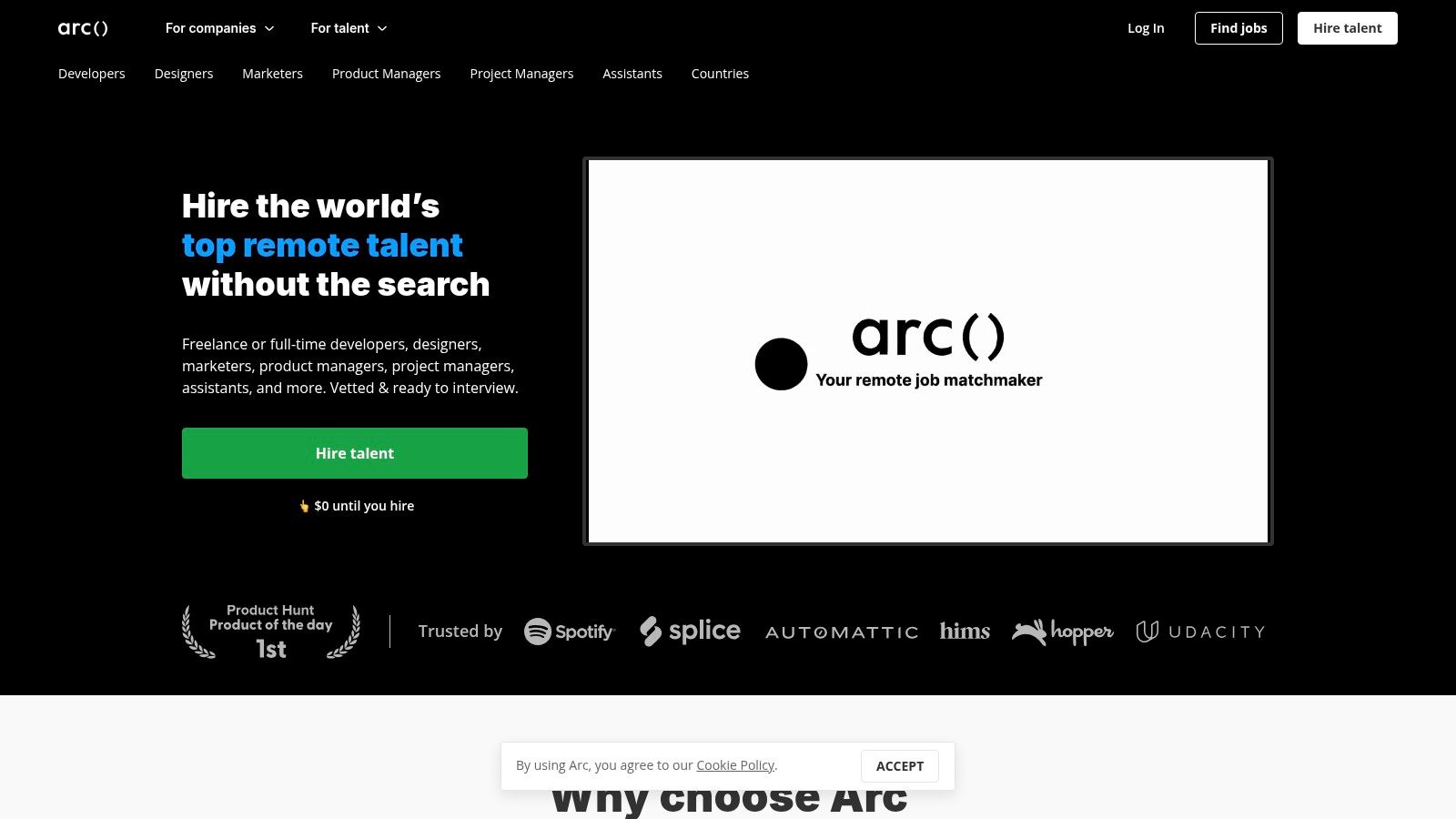
Unlike traditional job boards, Arc.dev takes a more hands-on approach by curating matches between developers and companies. This candidate-centric model means developers get personalized support throughout their job search. The focus is on quality over quantity, making it an excellent platform for experienced engineers who want to bypass the initial screening chaos common on larger sites and connect directly with serious employers.
Key Details & Strategy
Best Use Case: Senior developers looking for vetted, full-time, or long-term contract remote roles with top-tier US companies.
Pricing: Free for developers. The platform makes money from the hiring companies, ensuring a developer-first experience.
Pro Tip: Invest significant effort in the vetting process. A strong performance on Arc's technical and communication assessments is the key to unlocking the platform’s best opportunities and curated matches.
The main drawback is its smaller volume of available jobs and its strong focus on mid-to-senior talent, which makes it less suitable for entry-level developers. However, for its target audience, Arc.dev offers a high-signal, low-noise pathway to premium remote engineering positions.
Website: https://arc.dev
Top 12 Remote Developer Job Sites Comparison
| Platform | Core Features/Characteristics | User Experience/Quality ★ | Value Proposition 💰 | Target Audience 👥 | Unique Selling Points ✨ |
|---|---|---|---|---|---|
| Remote Engineering Jobs | Daily updated remote engineering jobs, tips & FAQs | ★★★★☆ High-quality, curated listings | 💰 Free, focused on engineering roles | 👥 Software engineers | 🏆 Engineering specialization, practical guidance |
| LinkedIn Jobs | Remote filters, networking, Premium tools | ★★★★ Mixed job quality, strong US focus | 💰 Free; Premium for extras | 👥 Broad professional network | ✨ Recruiter outreach, 'Open to Work' visibility |
| Indeed | Large aggregator, filters, resume upload | ★★★★ Frequent updates, some duplicates | 💰 Free access | 👥 All experience levels | ✨ Extensive job volume, salary info displayed |
| ZipRecruiter | One-tap apply, daily matches, mobile notifications | ★★★★ Fast application experience | 💰 Free user access | 👥 Wide range, from startups to enterprises | ✨ Mobile ease, matched job alerts |
| Glassdoor | Job board + company reviews, salary & interview insights | ★★★★ Useful due diligence tools | 💰 Free access | 👥 Job seekers researching culture | 🏆 Salary transparency & reviews in one place |
| Dice | Tech-only job board, detailed filters | ★★★★ Strong signal for tech roles | 💰 Free access | 👥 Tech professionals | ✨ Tech-specific filters, resume evaluation |
| Hired | Vetted candidates, interview requests, salary coaching | ★★★★ Efficient, selective marketplace | 💰 Free to join | 👥 Mid-senior remote engineers | 🏆 Interview coaching, salary transparency |
| Wellfound | Startup jobs, transparent salary & equity | ★★★★ Startup culture focus | 💰 Free access | 👥 Startup/job seekers | ✨ Direct chat with founders, equity info |
| Remote OK | Remote-only, developer focus, salary info | ★★★★ Quick browse, scam guidance | 💰 Free access | 👥 Remote developers globally | 🏆 Remote-native companies, transparent salaries |
| We Work Remotely | Remote-only, curated developer listings | ★★★★ Strong community reputation | 💰 Free access | 👥 Remote-first developers | 🏆 Developer job alerts, focused filtering |
| FlexJobs | Hand-screened remote/flexible jobs | ★★★★ Scam-free, vetted listings | 💰 Paid subscription required | 👥 Scam-conscious job seekers | 🏆 Manual vetting, flexible work focus |
| Arc.dev | Vetted remote developer marketplace | ★★★★ Candidate-friendly, focused vetting | 💰 Free to join | 👥 Senior software engineers | ✨ Silicon-Valley-style vetting, curated matching |
Building Your Winning Job Search Strategy
Navigating the landscape of remote software developer jobs can feel overwhelming, but with the right tools and a strategic approach, you can significantly improve your chances of landing the perfect role. This guide has armed you with a comprehensive toolkit, moving beyond generic job boards to specialized platforms tailored for remote engineers. We've explored everything from the vast networks of LinkedIn and Indeed to the niche, high-quality listings on Arc.dev and We Work Remotely. The key takeaway is that no single platform is the ultimate solution; a diversified strategy is your most powerful asset.
Synthesizing Your Search: From Tools to Strategy
The most effective job search combines broad-reach platforms with specialized, curated boards. Think of it as a funnel. Use the larger sites like LinkedIn or Indeed for initial market research and to set up wide-ranging alerts, but dedicate your most focused application efforts to the niche platforms.
For instance, a junior developer might find the volume on Wellfound or Dice beneficial for entry-level opportunities at startups. In contrast, a senior architect or a specialist in a high-demand niche like machine learning should prioritize platforms like Hired or Arc.dev, where companies are actively seeking top-tier, pre-vetted talent and are prepared to offer competitive compensation.
Key Actionable Steps for Your Job Hunt
To transform this list of resources into a successful job hunt, consider these immediate next steps:
Create a Tiered Application Plan: Select two to three "primary" platforms that best match your experience level and career goals (e.g., Remote OK for a focus on remote-first culture, Hired for high-paying roles). Supplement these with two to three "secondary" platforms for broader coverage.
Optimize Your Profiles: Don't just browse. Actively build out and optimize your profiles on each selected platform. For marketplaces like Hired and Arc.dev, this vetting process is mandatory and crucial. For sites like LinkedIn, a keyword-rich, detailed profile acts as a magnet for recruiters searching for remote software developer jobs.
Automate and Track: Use the alert features on every platform to your advantage. Create specific, filtered searches for your tech stack, desired seniority, and "remote" status. Use a simple spreadsheet or a project management tool to track your applications, interviews, and follow-ups to stay organized and persistent.
Ultimately, finding the right remote role is a marathon, not a sprint. The tools we've covered are designed to streamline the process, connect you with high-quality opportunities, and give you an edge in a competitive market. By combining a multi-platform approach with a polished professional brand and consistent effort, you are well-positioned to secure a rewarding remote engineering career that offers the flexibility and work-life balance you seek.
Tired of sifting through endless job boards every day? Let the best remote software developer jobs come to you with RemoteWeek, our curated newsletter that delivers hand-picked remote engineering opportunities directly to your inbox. Sign up for free at RemoteWeek and spend less time searching and more time coding.
